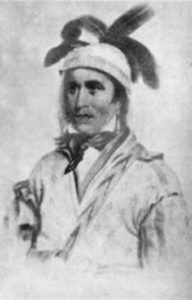
Opothleyahola
*The birth of Opothleyahola is affirmed on this date in c. 1778. He was a Native American, Muscogee Creek Indian chief, noted orator, and slave owner.
Also known as Opothle Yohola, he was from Florida, a Speaker of the Upper Creek Council, and supported traditional culture. Although known as a diplomatic chief and Red Stick traditionalist, he led Creek forces against the United States government during the Creek Wars. Later, the young man developed as an influential and eloquent speaker who used his skills for his people first and foremost. He was selected as a Speaker for the chiefs, a distinct political role on the National Council, and he later became a "diplomatic chief." He became a wealthy trader and owned a 2,000-acre plantation near North Fork Town. As did other Creek and members of the Five Civilized Tribes, he purchased enslaved Africans as workers for his plantation.
Opothleyahola joined the Freemasons and accepted Christianity, becoming a Baptist. Later he tried to overturn the Treaty of Indian Springs but was forced to make a new treaty with the federal government in 1832. He was commissioned as a colonel and led forces against the remaining Lower Creek and the Seminole in the first two wars of the US against them. Despite his efforts, he and his people were among the Seminole and others forced to be moved to Indian Territory in 1836, where they settled in the Unassigned Lands. During the American Civil War, Opothleyahola and Creek remained loyal to the federal government. On August 15, 1861, Opothleyahola contacted President Abraham Lincoln to request help for the loyalists. On September 10, they received a positive response, saying that the United States government would assist them.
The letter directed Opothleyahola to move his people to Fort Row in Wilson County, Kansas, where they would receive asylum and aid. On November 15, Confederate Col. Douglas H. Cooper, a former US Indian Agent, led 1,400 men, including pro-Confederate Indians, northward; he intended to convince Opothleyahola and his followers to support the Confederacy or to "drive him and his party from the country." Believing Federal promises of assistance, Opothleyahola led his band (including Seminole under Halleck Tustenuggee) toward Kansas. Along the way, they had to fight three battles against their pursuers and lost many of their goods in their quick departure.
At Round Mountain, Opothleyahola's forces drove back the Confederates to Fort Gibson. Many Creeks died that winter, among them Opothleyahola's daughter. Conditions for the Creek in Kansas continued to be very harsh. Opothleyahola died in the Creek refugee camp near the Sac and Fox Agency at Quenemo in Osage County, Kansas, on March 22, 1863. He was buried beside his daughter near Fort Belmont in Woodson County, Kansas.